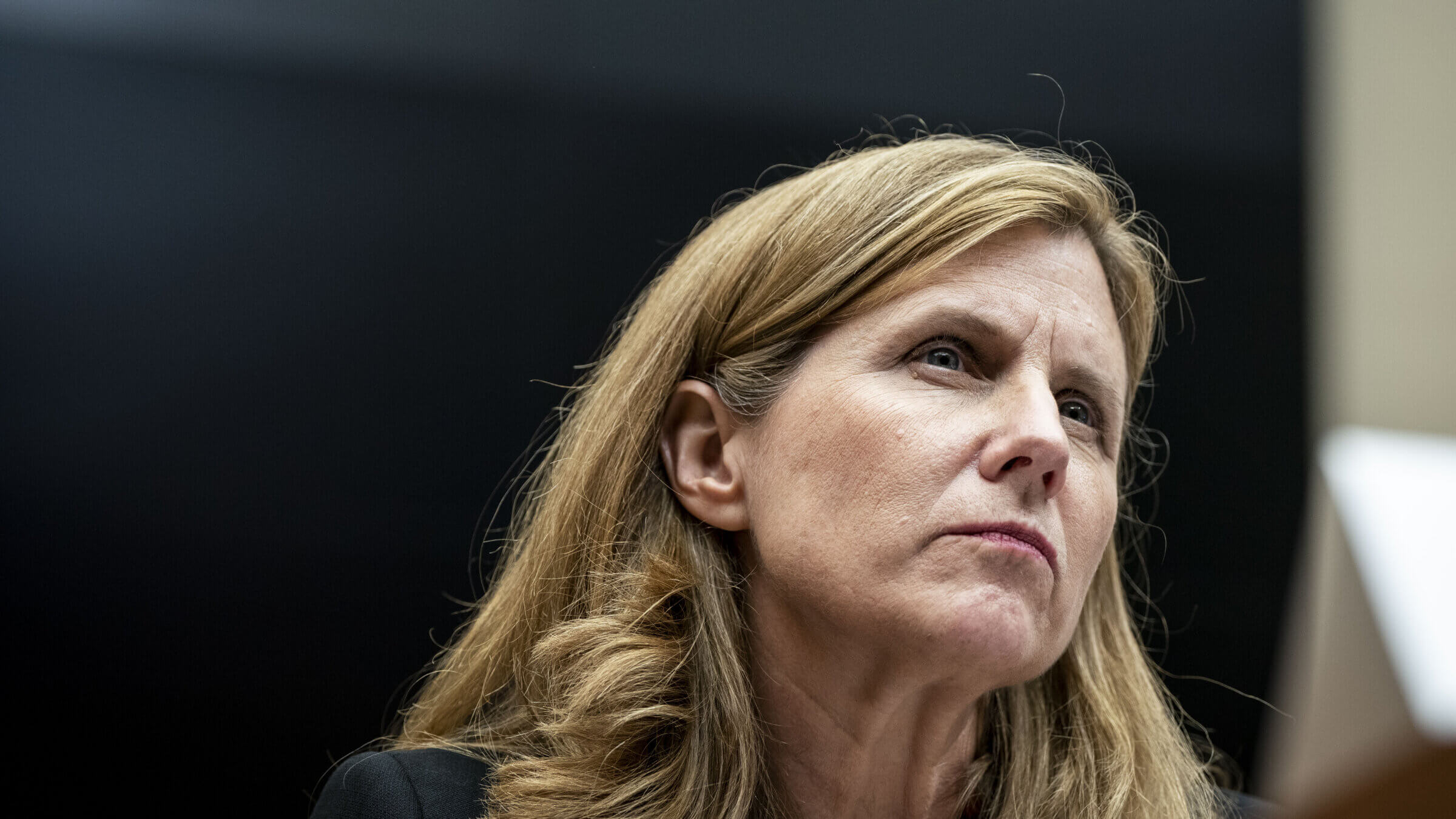Calling for genocide is antisemitic. Why couldn’t the president of my alma mater say so?
University of Pennsylvania president Liz Magill’s inability to unequivocally condemn antisemitism reflect a broader problem.

Liz Magill, president of the University of Pennsylvania, during a House Education and the Workforce Committee hearing in Washington, D.C., on Tuesday, Dec. 5, 2023. Photo by Haiyun Jiang/Bloomberg via Getty Images
“Does calling for the genocide of Jews violate Penn’s rules or code of conduct? Yes or no?”
It should have been an easy answer. But somehow, it wasn’t.
The president of the University of Pennsylvania, Liz Magill, recently testified before members of Congress on the alarming uptick in campus antisemitism. When questioned by Rep. Elise Stefanik, the president of my alma mater did not definitively say before the room — and the world — that “calling for the genocide of Jews” is hate speech, condemnable, and won’t be tolerated at the University of Pennsylvania.
Instead, she said that such sentiments are “context dependent” and only problematic when they “turn into conduct.” Understandably, Liz Magill’s response has outraged the masses — members of the Penn community, Jews, non-Jews and world leaders alike. I’m relieved to see so many appalled, expressing their anger and disdain at this absolute failure in leadership, for which she later apologized.
But there’s an essential question I’ve noticed is missing from the masses’ vocalized horror: Why?
Why didn’t President Magill immediately answer with an unequivocal, resounding “Yes” when asked if “calling for the genocide of Jews” is antisemitic?
This question underscores a malignant fear of making definitive statements in support of the Jewish people, and of taking an unapologetic stance against antisemitism, infecting our most esteemed universities.
‘Jewish suffering is not what people want to hear about’
In class last week at Columbia University’s School of Professional Studies, where I am studying for my master’s degree in narrative medicine, I did a presentation on clips from the film Shoah, Claude Lanzmann’s nine-hour documentary about the Holocaust.
We had been discussing W.E. Sebald’s award-winning fictional Holocaust novel, Austerlitz, for three weeks prior. My introduction of more Holocaust content wasn’t out of the blue, but an attempt to continue the conversation. The presentation guidelines were to bring art or media that thematically related to the discussion at hand.
The clips I showed featured harrowing testimony from Filip Muller about his unfathomable experience as a Sonderkommando, a gas chamber attendant, at Auschwitz. As the granddaughter of Holocaust survivors, this material felt — and feels — particularly important; as I sit in classes with people from all different walks of life, peers who did not grow up with a robust Holocaust education like I did in Jewish day school, I feel an obligation to share survivor testimonies, to share the horrors, so others can help the world Never Forget.
You can imagine my surprise when my professor, someone whom I look up to, made their discomfort with my choice of material known to my class. They announced that this might not be the right place for such disturbing material because of how hard it is to hear and process such atrocities.
I was stunned. The footage included no gore, no blood, no death — just vivid descriptions from Muller as the camera panned over crematorium ruins in Auschwitz. How could that not be allowed in a classroom, a place where we are supposed to teach and learn?
I met with this professor outside of class to discuss their reaction. It turns out their reasoning was even worse than I imagined.
They told me that the material was inappropriate because of “all the death and dying in Gaza,” the fact that some of my classmates are out at “the protests,” and that they don’t want to make those students feel “uncomfortable or unsafe” in the classroom.
To their credit, my professor emphasized that they were not trying to censor conversation around the Holocaust. They were just concerned about the implications of having such conversations in our classroom “at this difficult time.” They added that, for better or for worse, “This is a particular moment where Jewish suffering is not what people want to hear about.”
Again, I was stunned. I understand and agree with the importance of fostering class environments that are warm, encouraging and open-minded, places where students can share their thoughts safely and freely. But when did talking about the Holocaust become controversial? When did talking about Jewish suffering become controversial? How is it threatening to anyone?
President Magill’s blubbering “context dependent” answer felt rooted in the same logic as that of my professor. Both responses reflect a fear of making people uncomfortable, and a fear of not leaving enough space for all perspectives to safely dwell in an academic setting — even when those perspectives are truly genocidal.
These are the same reasons that most of my classmates and non-Jewish peers haven’t spoken up in support of the Jewish community: They don’t want to say anything controversial, anything that will get them “canceled.”
And I get it. There’s a lot of gray area when it comes to talking about Israel and its politics, especially as they pertain to the Palestinian people. By all means, engage in rigorous debate. Ask critical, probing questions. Press on the status quo. Disagree with Israeli governmental policies.
But do not let the fraught and complicated nature of these conversations — around Israel, Palestinians, the current Israel-Hamas War, the tragic loss of innocent life in Gaza — impair your ability to stand up against what is clearly beyond the pale.
Both the Jewish and Palestinian communities are undeniably suffering and grieving. And one can be both a Zionist and supportive of Palestinian self-determination.
But the fact that many truths can coexist does not, and should not, make acknowledging only one of those truths at a moment in time controversial. There are certain statements that should be unequivocal:
Calling for the genocide of Jews is antisemitic. Acknowledging the atrocities of the Holocaust shouldn’t be controversial. Antisemitism shouldn’t be tolerated in any way, shape or form. Hamas is a terrorist organization, and their heinous acts on Oct. 7 are not justified. Jews have a right to self-determination in their ancestral homeland, Israel — even if one may not agree with all the policies of the Israeli state — and to deny this right is antisemitic.
The principal “context” that should be considered when discussing the experiences of the Jewish people is the consequences to Jewish people themselves, not the potential discomfort or hurt feelings of those who oppose us. People-pleasing shouldn’t matter when the people you’re trying to please want Jews dead.
A message from our Publisher & CEO Rachel Fishman Feddersen

I hope you appreciated this article. Before you go, I’d like to ask you to please support the Forward’s award-winning, nonprofit journalism so that we can be prepared for whatever news 2025 brings.
At a time when other newsrooms are closing or cutting back, the Forward has removed its paywall and invested additional resources to report on the ground from Israel and around the U.S. on the impact of the war, rising antisemitism and polarized discourse.
Readers like you make it all possible. Support our work by becoming a Forward Member and connect with our journalism and your community.
— Rachel Fishman Feddersen, Publisher and CEO




























